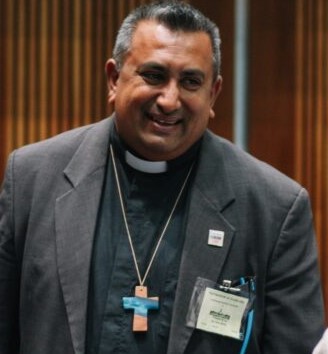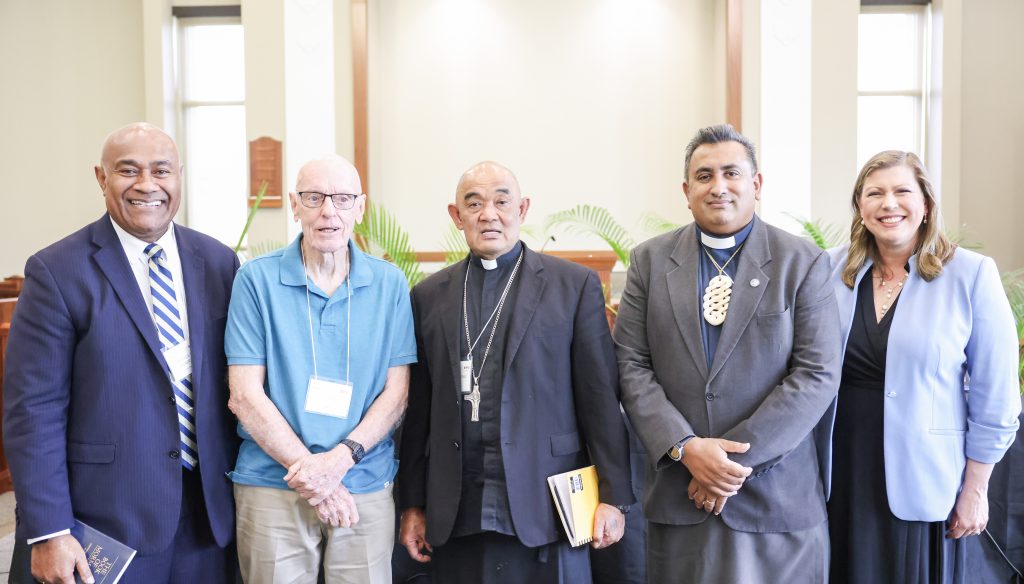
Rev. James S. Bhagwan is an ordained minister of the Methodist Church and general secretary of the Pacific Conference of Churches. This post is based on his remarks presented during the panel “Human Dignity and Faith Traditions in Oceania” at the Oceanian Perspectives on Human Dignity Conference held at BYU–Hawaii in Laie, Oahu, Hawaii, 23–25 April 2024.
I begin by acknowledging that deep spirituality permeates the communities of Oceania and is at the heart of the Pacific peoples’ relationship with each other and with the world. Spirituality is integral to the way we interpret, understand, and interact with one another and with the natural world. And this spirituality is enhanced by the many faith traditions of this world, which have grown roots in our diverse Pacific communities. These faith traditions are shared with 85% of those who share this planet. The language of spirituality—the expression in metaphor, in image, in silence, in hymns of praise and cries for justice, in reflection and meditation, in ethical action, in confession and repentance, and in justice and compassion—is part of our way of life. That spirituality is not only experienced through faith communities but also through indigenous culture—that deep sense of vanua or fenua, of rootedness not only to land but also rootedness in respect and celebration of just relationships with all creation.
I speak first and foremost as a Christian, a believer in and follower of the Way of Jesus the Christ. Before any cultural or denominational teaching, my earliest reference to human dignity has been the gospel of Jesus, expressed as love of God, neighbor, and self. Justice is a social expression of this love. The creation story in the Bible’s book of Genesis reminds us that we are shaped and molded and have breathed into us the divine spirit of God. From this, we have the understanding that all humans are created in the Imago Dei or Likeness of God and are equally and unconditionally loved by God.

One of the key founders of the Methodist movement, the Anglican priest the Rev. John Wesley, took this understanding of the Imago Dei to be from the natural image in our “humanness,” to the moral image of holiness and love intended for humanity by God, and the political image. Wesley’s relational anthropology emphasized right relationships as central to human existence and recognized four core relationships for humans: with God (expressed in knowing, loving, obeying, and experiencing God eternally), with other humans (expressed in loving service), with lower animals (expressed as loving protection), and with ourselves (expressed as self-acceptance). Wesley also emphasized the characteristics of understanding, will, and liberty.
Will is understood as the capacity to love God and neighbor and the habit or practice of doing so; while liberty or freedom is understood as the capacity to enact that will or not. This gracious freedom is, therefore, responsible.
Wesley’s anthropology was holistic in the sense that he considered all dimensions of human life, beyond the mere physical. This led him to explore the soul—the spiritual and mental aspects of humanity and their relation to the physical body. For Wesley, while the body and soul were distinct from each other, their connectedness was important and appropriate. In other words, both were integral to humanity as the Imago Dei. For Wesley, the Christian affirmation of the sacredness of human personality was inseparable from address to the realities—economic, political, social, and technical—that battered and suppressed humanity and wreaked such physical, moral, and spiritual destruction among the poor.
However, the challenge of reconciling faith and culture in some Pacific contexts has been a difficult journey. For the first three to four decades of its autonomy as a self-governing church, the Methodist Church struggled to articulate itself in a culturally contextual manner, as part of its self-determination and affirmative action. Unfortunately, this developed into a form of ethnonationalism that led to an “othering” rather than “neighboring,” as the concept of neighbor shifted from that of the Christian understanding of “other/stranger/different” to that of kinship and indigeneity.
The 3rd Pacific Island Mission Conference, held on Viwa Island in 2010, acknowledged in its outcome statement,
We have identified that some elements of our conservative theologies do not give us the capacity to address the critical issues facing our communities; rather they adversely impact on our gender relations, our ability to dignify the other, our ability to analyse and address the factors creating the divisions of poor and wealthy in our communities and our part in the destructive exploitation of the environment. Furthermore we recognise . . . . [t]hat religious fundamentalism mixed with ethno-nationalism is at the root of much of the violence—gender, racial and political—which affects our world.[1]
Since that time there has been a concerted effort for more inclusive and human dignity–affirming reflections on faith and culture, which have had positive impact in the Church and society. Ecumenical relations have improved, and issues of gender justice and child protection are being mainstreamed into the life and work of the Church. Last year marked the 36th anniversary of the first military coup d’état and the 144th anniversary of the arrival of the first Indians brought to Fiji under the British modern slavery enterprise called the “indenture system.” The Methodist Church held a special reconciliation service to seek forgiveness from the Indo-Fijian community and launch a 10-year campaign of national reconciliation. This included the signing of the Forward Fiji Declaration by religious, political, and community leaders, vowing that “there will be no more coups and divisions” and committing instead to promote mutual understanding and respect to build the new Fiji. This is a first step in an important journey in which human dignity will underpin the process of truth-telling and reconciliation.
For the Pacific Conference of Churches, the concept of the “Island of Hope,” developed in response to economic globalization earlier this century, is an Oceanian expression of both human dignity and, in a wider commitment to “the whole inhabited earth” and care for creation/environment, creation dignity. I would just like to highlight the contours of this Island of Hope:
[C]aring and concern for others within the extended families and compassion for all people, especially for the sick and elderly[,] are values of the communities; respect, hospitality, generosity, and forgiveness are other marks of the traditional communities . . . .
The ethics of “The Island of Hope” are based on the deep respect for the whole community of life. It fosters a culture of sharing and caring, based on justice. Its values reflect God’s care for creation and Christ’s teaching to love one another and do justice to the poor . . . .
Nobody is excluded.
The land, the sea and people are integral parts of one entity. Subsistence farming, sustainable agriculture and the sensitivity of the sacredness of the trees and the sea are part of their identity.[2]
The Island of Hope is in tune with nature and by sharing and caring, a place to which people want to journey to celebrate life in all its fullness (Isaiah 25:6). The Island of Hope has the mana (power) to draw human beings together. The Island of Hope is sustainable, wholesome, peaceful and all embracing.
Over the last two decades the Island of Hope concept has been embraced by Pacific Churches into the concept of the Pasifika Household of God, which must be inclusive of the diversity of life in the Pacific—indigenous and non-indigenous, human and non-human.
Of course, as this conference will address, there are challenges with embracing this concept in each context in this diverse region. However, as a goal or work to ensure a “whole of life approach,”[3] the Pasifika Household of God represents a weaving, or reweaving, of faith, spirituality, traditional knowledge and wisdom, policy, and, above all, praxis for the flourishing of Oceania—in which human dignity is a key part.
I conclude by reflecting on human dignity as the way love is manifested in the public space as justice. For the Pacific Conference of Churches, this is embodied in our work on self-determination and peace, through the Just and Safe Communities of Women and Men and Child Protection programs and in our political and social engagements on self-determination.
We recognize that “othering” is a method used in colonization, neo-colonization, militarization, and the legitimation of extractivism and exploitation.
We have Pasifika or Oceanic communities that continue to struggle for self-determination as an expression of their dignity in Ma’ohi Nui, Kanaky, Bougainville, and, I must add, here in Hawai’i.
We have West Papua where the human dignity of indigenous Melanesians is consistently attacked, stripped, and denied as part of an implicit, if not explicit, policy by Indonesia, which is a signatory to multiple covenants on human, social, cultural and political rights.
We have the issue of human dignity in the contexts of labor mobility and climate change–induced displacement and relocation.
We have the AUKUS military pact and other Indo-Pacific military strategies that use development aid, trade, and climate finance as instruments of diplomatic coercion for countries burdened with debt and the impacts of climate change—while major carbon-emitting countries refuse to curb fossil-fuel production and carbon emission.
How do we, gathered here to reflect on human dignity, reflect on aspects of human dignity such as agency and self-determination? How do we weave an approach to human dignity that recognizes collective and individual dignity and the dignity of creation—such as the recent recognition of whales by traditional leaders of Aotearoa, Ma’ohi Nui, and the islands now called Cook Islands?
The affirmation of human dignity, and dignity of creation, in both theology and action is essential for those who profess faith in Jesus if we wish to see our region and the world experience the vision of Jesus—that we may have life, and life in its fullness. Life in abundance.
Vinaka Vakalevu. Mahalo.
References
[1] James Shri Bhagwan, Sailing to the Island of Hope: A Wesleyan Ethical Framework for 21st Century Fiji 15 (unpublished Master of Theology in Christian Ethics thesis 2013, Graduate School of the Methodist Theological University) (quoting God’s Pacific People Programme & Pacific Conference of Churches, The Mission Call from Viwa to the Pacific Churches).
[2] World Council of Churches, The Island of Hope: An Alternative to Economic Globalization, Dossier No. 7, at 7, 12 (2001).
[3] As articulated by the Rev. Professor Upolu Lumo Vaai, principal of the Pacific Theological College, which is transitioning into the Pacific Communities University under this approach.
